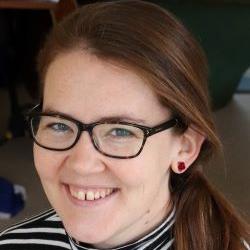Biography
Rebecca completed her medical training at the University of Cambridge and University College London. She did her PhD with Professor Charles Swanton at the CRUK London Research Institute (now part of the Francis Crick Institute) on UCL’s MBPhD scheme. After completeing foundation and core medical training in London, Rebecca joined the department of Oncology as a Clinical Research Associate, working on the Pioneer trial in early breast cancer. She is now an medical oncology trainee working at Addenbrooke’s hospital, alongside her research work, which is hosted by Professor Jason Carroll at the CRUK Cambridge Institute.
Research
Rebecca’s research focuses on oestrogen receptor (ER) positive breast cancer, and identifying new therapeutic strategies to treat patients with this tumour type. ER positive breast cancer is the most common cancer among women in the UK with nearly 40000 cases diagnosed each year. There is considerable clinical heterogeneity within this patient group; novel and specific treatment strategies are needed for those with the most aggressive form of the disease.
Key areas of interest:
- CRUK Cambridge Centre research programme(s): Breast Cancer
- Tumour type/site: Breast Cancer
Publications
- BCL9L Dysfunction Impairs Caspase-2 Expression Permitting Aneuploidy Tolerance in Colorectal Cancer. López-García C, Sansregret L, Domingo E, McGranahan N, Hobor S, Birkbak NJ, Horswell S, Grönroos E, Favero F, Rowan AJ, Matthews N, Begum S, Phillimore B, Burrell R, Oukrif D, Spencer-Dene B, Kovac M, Stamp G, Stewart A, Danielsen H, Novelli M, Tomlinson I, Swanton C. Cancer Cell. 2017 Jan 9;31(1):79-93. doi: 10.1016/j.ccell.2016.11.001. PMID: 28073006
- Re-Evaluating Clonal Dominance in Cancer Evolution. Burrell RA, Swanton C. Trends Cancer. 2016 May;2(5):263-276. doi: 10.1016/j.trecan.2016.04.002. Epub 2016 Apr 27. PMID: 28741512
- Chromosomal instability selects gene copy-number variants encoding core regulators of proliferation in ER+ breast cancer. Endesfelder D, Burrell R, Kanu N, McGranahan N, Howell M, Parker PJ, Downward J, Swanton C, Kschischo M. Cancer Res. 2014 Sep 1;74(17):4853-4863. doi: 10.1158/0008-5472.CAN-13-2664. Epub 2014 Jun 26. PMID: 24970479
- Tumour heterogeneity and the evolution of polyclonal drug resistance. Burrell RA, Swanton C. Mol Oncol. 2014 Sep 12;8(6):1095-111. doi: 10.1016/j.molonc.2014.06.005. Epub 2014 Jul 10. PMID: 25087573
- Tolerance of whole-genome doubling propagates chromosomal instability and accelerates cancer genome evolution. Dewhurst SM, McGranahan N, Burrell RA, Rowan AJ, Grönroos E, Endesfelder D, Joshi T, Mouradov D, Gibbs P, Ward RL, Hawkins NJ, Szallasi Z, Sieber OM, Swanton C. Cancer Discov. 2014 Feb;4(2):175-185. doi: 10.1158/2159-8290.CD-13-0285. Epub 2014 Jan 19. PMID: 24436049
- The causes and consequences of genetic heterogeneity in cancer evolution. Burrell RA, McGranahan N, Bartek J, Swanton C. Nature. 2013 Sep 19;501(7467):338-45. doi: 10.1038/nature12625. PMID: 24048066
- Replication stress links structural and numerical cancer chromosomal instability. Burrell RA, McClelland SE, Endesfelder D, Groth P, Weller MC, Shaikh N, Domingo E, Kanu N, Dewhurst SM, Gronroos E, Chew SK, Rowan AJ, Schenk A, Sheffer M, Howell M, Kschischo M, Behrens A, Helleday T, Bartek J, Tomlinson IP, Swanton C. Nature. 2013 Feb 28;494(7438):492-496. doi: 10.1038/nature11935. PMID: 23446422

